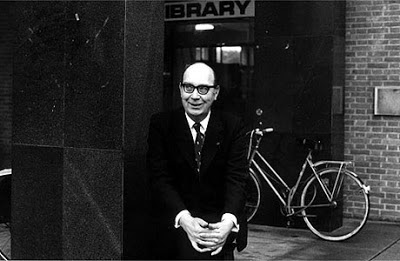Larkin's poems aren't of the cheerful variety, but they are the sort that will stay with you. Haunting your dreams should you read them before bed and lingering in the back of your mind all day if you happen to take in a stanza or two over breakfast. Thought provoking and mysterious, Larkin has a way with words. An ability to bring into focus in a few concise lines what most authors struggle to convey in an entire novel.
He's been described as "The saddest heart in the post-war supermarket" and in some ways I agree. He's not an optimist, but I imagine he'd deplore the very idea of optimism vs. pessimism. Life wasn't that simple for him and frankly shouldn't be for any of us. He was an emotional slueth, picking up on parts of humanity that most overlook--the parts that sting. For that, I am grateful.
"Deprivation is for me what daffodils were for Wordsworth.”
“I think writing about unhappiness is probably the source of my popularity, if I have any-after all, most people are unhappy, don't you think?”
“Nothing, like something, happens anywhere.”
“Life has a practice of living you, if you don't live it.”
“Earth never grieves, I thought, walking across the park, watching seagulls cruising greedily above the ground looking for heaven knows what. Don't you think it's a good line? A very good line”
“I have a sense of melancholy isolation, life rapidly vanishing, all the usual things. It's very strange how often strong feelings don't seem to carry any message of action”
“Why can't one stop being a son without becoming a father?”
Next, Please
Always too eager for the future, we
Pick up bad habits of expectancy.
Something is always approaching; every day
Till then we say,
Watching from a bluff the tiny, clear
Sparkling armada of promises draw near.
How slow they are! And how much time they
waste,
Refusing to make haste!
Yet still they leave us holding wretched stalks
Of disappointment, for, though nothing balks
Each big approach, leaning with brasswork prinked,
Each rope distinct,
Flagged, and the figurehead wit golden tits
Arching our way, it never anchors; it's
No sooner present than it turns to past.
Right to the last
We think each one will heave to and unload
All good into our lives, all we are owed
For waiting so devoutly and so long.
But we are wrong:
Only one ship is seeking us, a black-
Sailed unfamiliar, towing at her back
A huge and birdless silence.
In her wake No waters breed or break.
High Windows
When I see a couple of kids
And guess he's fucking her and she's
Taking pills or wearing a diaphragm,
I know this is paradise
Everyone old has dreamed of all their lives--
Bonds and gestures pushed to one side
Like an outdated combine harvester,
And everyone young going down the long slide
To happiness, endlessly.
I wonder if Anyone looked at me, forty years back,
And thought, That'll be the life;
No God any more, or sweating in the dark
About hell and that, or having to hide
What you think of the priest.
He And his lot will all go down the long slide
Like free bloody birds. And immediately
Rather than words comes the thought of high windows:
The sun-comprehending glass,
And beyond it, the deep blue air, that shows
Nothing, and is nowhere, and is endless.



No comments:
Post a Comment